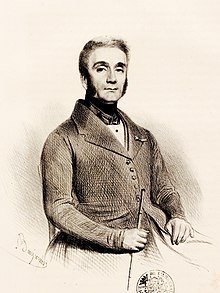Félix-Auguste Duvert
Felix-Auguste Adolphe Duvert (born January 12, 1795 in Paris , † October 19, 1876 there ) was a French playwright and vaudevillist .
Life
Before Duvert devoted himself to the theater, he served from 1811 with the tirailleurs of the Jeune Garde Impériale (Young Guard) Napoleon I , later he was transferred to a dragoon regiment, which he held until the Armée de la Loire (Loire Army) Napoleon was dissolved III. belonged in 1871.
In 1823 he began his stage career at the Théâtre du Gymnase Marie Bell , where he was able to celebrate his first successes. Augustin-Théodore de Lauzanne , who in the jointly composed pieces particularly took care of the description of intrigues and misunderstandings as well as the drafting of the characters, and Antoine-François Varner became his permanent collaborators. This joint effort produced a large number of stage works over a period of around 50 years. Duvert and Lauzanne were seen as a team so much that they became famous under the name "Duvert et Lauzanne".
Félix-Auguste Duvert is buried in the Père-Lachaise cemetery.
Works (selection)
In 1836 Emmanuel Théaulon, Félix-Auguste Duvert and Adolphe de Leuven wrote the Posse Actéon et le centaure Chiron ( Aktaion and the Centaur Cheiron ), which premiered on March 19 of this year at the Théâtre du Palais-Royal .
In 1843 Félix-Auguste Duvert, Charles Varin and Paul de Kock wrote Les soupers de carnaval , a colorful mixture of couplets , which was also performed on February 26th of that year at the Théâtre du Palais-Royal .
On November 18, 1843, the play L'homme blasé (The bored man) by Félix Auguste Duvert and Augustin Théodore de Lauzanne de Vauroussel was performed in the Théâtre du Vaudeville , which Johann Nestroy used as a template for his torn .
Web links
- Information on Félix-Auguste Duvert in the database of the Bibliothèque nationale de France .
- Catalog of works on the website of the Munich Digitization Center
| personal data | |
|---|---|
| SURNAME | Duvert, Felix-Auguste |
| ALTERNATIVE NAMES | Duvert, Felix-Auguste Adolphe |
| BRIEF DESCRIPTION | French playwright and vaudevillist |
| DATE OF BIRTH | January 12, 1795 |
| PLACE OF BIRTH | Paris |
| DATE OF DEATH | October 19, 1876 |
| Place of death | Paris |
